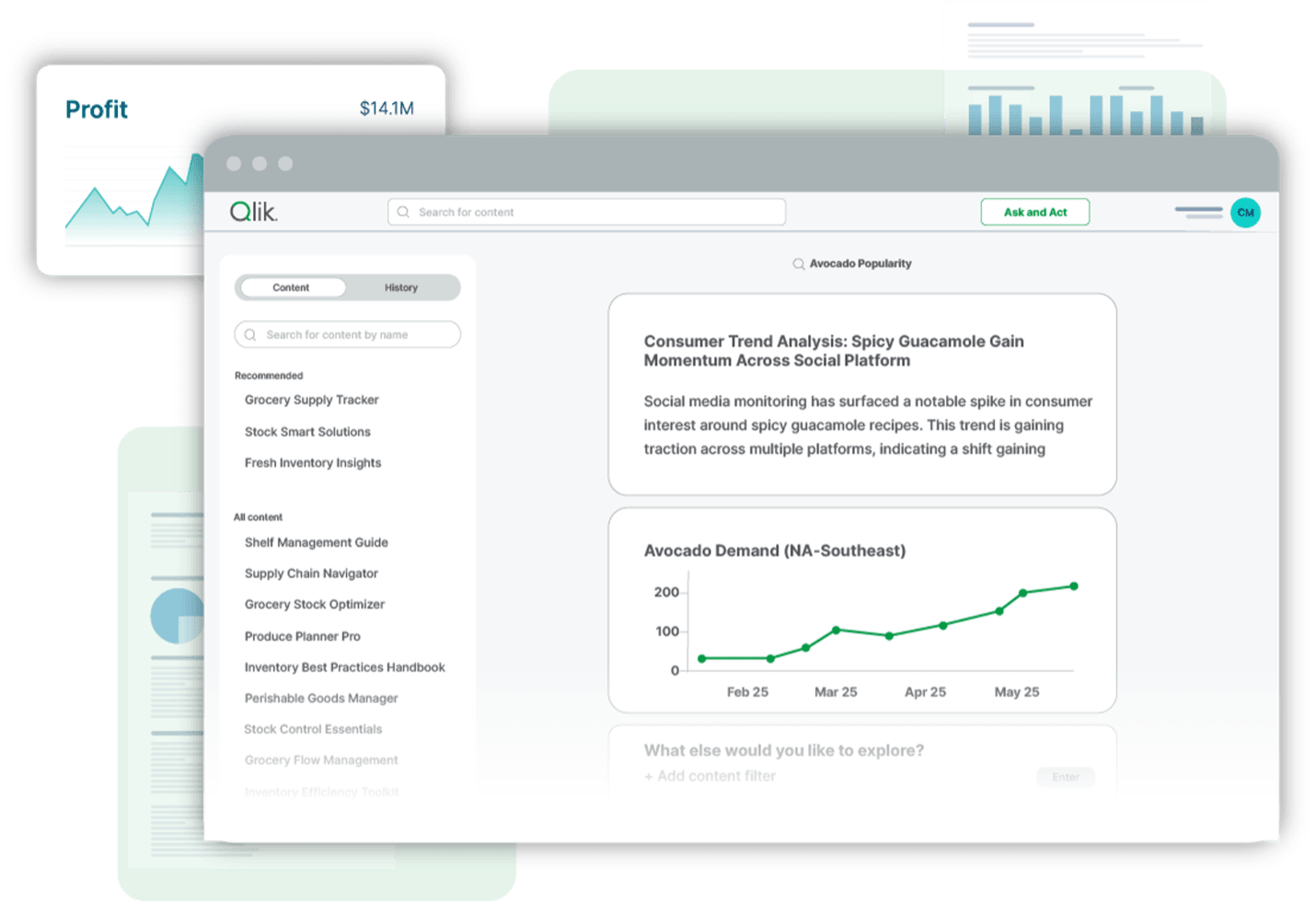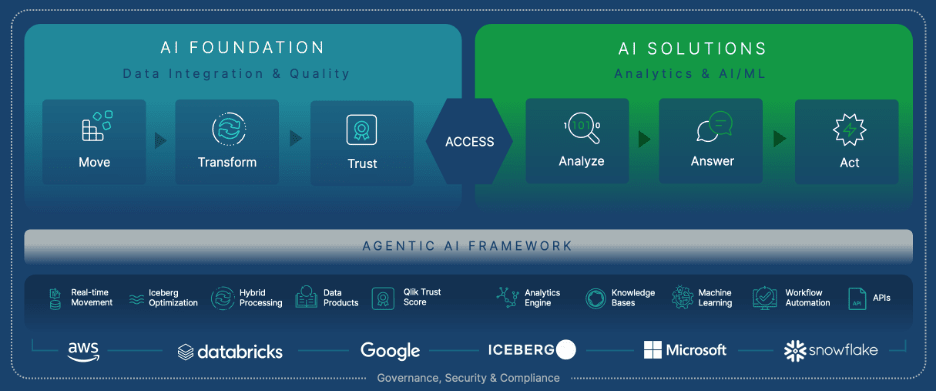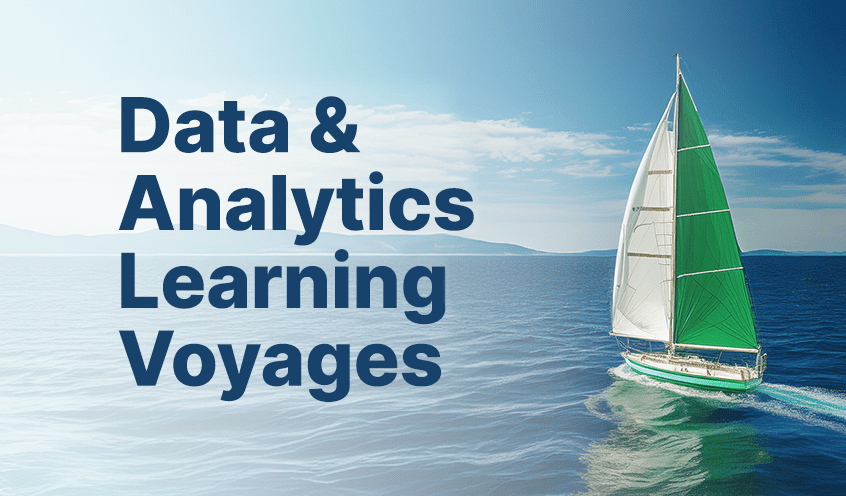The future of data and analytics will be nothing like the experience we're used to today. We are at the beginning of a transformation that will fundamentally reshape how businesses use data, make decisions, and create value. At the center of this revolution is Agentic AI.
Agentic AI fundamentally changes the way we work with data – moving from passive, reactive AI systems to autonomous, goal-oriented agents capable of reasoning, planning, and executing complex tasks across diverse data landscapes. This shift will transform analytics from something we use to an intelligent partner that proactively drives insights, actions, and business outcomes.
The evolution of Qlik AI
We first started infusing AI into our portfolio in 2013, when we evolved the unique Qlik analytics engine to support machine learning and neural networks. In 2019, we introduced Insight Advisor, an intelligent natural language assistant built directly into Qlik Sense. That kicked off a journey of rapid innovation that resulted in the introduction of new generative and predictive AI solutions including Qlik Answers and Qlik Predict (Qlik Predict is the new name for Qlik AutoML). Qlik has been consistently recognized as a leader in AI-powered, natural language analytics by Gartner since 2019.
Along the way, we began to use generative AI in more autonomous ways to access various data types, generate complex insights, and reason through actions. Even in its infancy, we recognized that agentic AI could be transformative, capable of working through vastly more complex business challenges than the simple chat bots ChatGPT had made famous. It’s now clear that an agentic AI architecture – a network of agents working together autonomously to solve complex business problems – will transform the industry.
To unlock the potential of agentic AI, we first targeted a largely untapped opportunity. The vast majority of enterprise data exists in unstructured formats – documents, knowledge repositories, emails, etc. We sought to make this vast resource available to everyone, to support decisions in a similar fashion to what we do with analytics. With our acquisition of Kyndi in January 2024, we strengthened our capabilities in natural language processing and generative AI. We launched the first iteration of Qlik Answers – specifically designed to deliver personalized insights from unstructured data in a fast, plug-and-play solution.
What we’re doing next
Now, we’re taking the next step – unifying structured data analytics and unstructured data. The true power of agentic AI emerges when we bridge this gap. By combining analytical insights from our unique engine with answers from unstructured content, our agents can generate the most complete and relevant understanding of a problem and drive actions that create entirely new levels of business value.

Going forward, we're investing heavily in our agentic AI framework to make our data and analytics agents the absolute best in the market at driving value from data. This isn't just about technology – it's about creating an end-to-end, agentic platform that understands business context and can employ complex reasoning to break down tasks and take the necessary steps to execute them. Doing this across the complete lifecycle from raw data to decision to action requires end-to-end capabilities, and our platform has all the necessary ingredients, having been bolstered by strategic acquisitions including Talend in 2023 and Upsolver in early 2025. Qlik now offers a seamless, scalable cloud platform for data, analytics and AI, underpinned by a rapidly evolving agentic AI framework.
Our vision for the future
To solve complex business problems, AI agents will need to not only deliver different capabilities, but also work across entirely different business systems, vendors, and ecosystems. Qlik will be uniquely positioned to serve as an agentic data intelligence layer that helps agents across complex systems interact with data, generate insights, and execute actions. Our agentic AI experience will include assistants and agents that mirror how human-based decision-making and task execution works today – enlist your best minds, comb through data, perform complex analysis, examine various scenarios, return with recommendations and action plans, and then execute them. The difference will be scale, speed, and continuous operation.

Qlik’s Agentic AI-Powered Platform

This agentic framework will deliver enhanced capabilities and value both within and outside the Qlik platform. Customers will have the ability to easily build and deploy custom, embeddable assistants targeted at specific business challenges, using customer’s structured and unstructured data. These assistants will tap into our network of agents to deliver the most powerful analytical insights, knowledge, and action where and how people work. Assistants can be easily created in a plug-and-play manner using analytics applications, knowledge bases, and automations from Qlik, and seamlessly embedded into operational systems for easy access.
Qlik is building a network of specialized agents into our framework, all tasked with a specific domain, such as:
Data Integration Agents
Data Integration Agents serve as the backbone of the data integration architecture, using AI to deliver a trusted data foundation for AI. These agents will automate complex, multi-step data preparation tasks, ensuring that data sets are optimized for a wide range of AI applications. Additional agents will actively monitor and take actions to ensure data quality and readiness for downstream workloads. By embedding AI into data integration workflows, Qlik will enable organizations to prepare data that is not only reliable and trusted but also purpose-built for specific analytical and machine learning needs.
Analytics Agents
Unstructured Data Agents
For unstructured data, Qlik has built a world class, RAG (retrieval augmented generation) architecture that was introduced with Qlik Answers in 2024. This unlocks insights from vast stores of unstructured information, making it accessible and actionable for users. And with simple, plug-and-play deployment, it can index a variety of unstructured content and be up and running in under an hour. And as mentioned, we are evolving Qlik Answers to deliver combined responses from both structured and unstructured data, and initiate action through automations.
Predictive Agents
Predictive Agents will shift the focus of analytics from historical to forward-looking intelligence. It will collaborate with data integration agents to identify or build machine learning-ready data sets, and then train models using intelligent model optimization, introduced in 2024, which automates the process a data scientist would take to train machine learning models. It then will generate predictions and forecasts and deliver the results for analysis through assistants and dashboards. In some cases, it will be able to autonomously act based on evaluating scenarios and determining optimal next steps. This capability will make predictive insight available to a wider audience to affect decision-making at all levels.
Discovery Agents
Discovery Agent, announced this year at Qlik Connect, will continuously monitor a vast range of data to identify important trends, anomalies and outliers. Rather than requiring users to sift through dashboards, AI can now watch your data for you, delivering personalized digests that allow users to understand the most relevant issues and immediately follow-up through natural language assistants or analytics apps. The Qlik Analytics Engine will offer a uniquely powerful ability to inspect a wide range of dimensional combinations at high-scale and speed.
Automation Agents
To drive outcomes, Automation Agents will orchestrate action in downstream systems and workflows. It will execute steps automatically or in collaboration with users to achieve business objectives. Built on Qlik’s robust automation framework, the agent will use existing workflows or create them dynamically, ensuring that business processes remain responsive and aligned with the latest analytical insights.
Productivity Agents
Productivity Agents will exist across the Qlik Cloud platform, embedded in all workflows and activities, providing contextual help, developer support, and analytical assistance directly within applications. These agents will streamline the user experience, drive data literacy, and empower both users and developers to get more from the Qlik platform.
The Importance of Interoperability
The future ecosystem of business technology and AI agents will require interoperability. This means a complex network of agents, interoperating across various systems, to tackle widescale business challenges that traditional approaches simply can’t solve. Qlik has always been an open platform, and our agents will interoperate directly with third-party AI systems and emerging technologies such as model context protocol (MCP) and agent2agent protocol (A2A) through our open APIs. As agent marketplaces develop, our agents will also be available there to ensure customers can leverage the full range and power of Qlik’s capabilities.
Together, our agents will form an adaptive, intelligent AI framework that will serve as the foundation for the next-generation of data and analytics – informing and automating decisions in new, transformative ways. This new agentic experience will move people beyond manual processes to a world where AI actively assists people in preparing, analyzing, predicting, and acting on data, all within a governed, scalable, independent platform.
Partner with us
As the data and analytics landscape rapidly evolves, Qlik is committed to investing in a world-class agentic AI experience and platform that will redefine how organizations use data to create value. Qlik will empower businesses to move beyond traditional manual processes – through intelligent agents that work together to deliver insight and action that drives outcomes in the most complex environments. There has never been a more compelling time to partner with Qlik. Together, we can unlock the full potential of your data, accelerate your AI journey, and deliver the future of data and analytics.
For more information on Qlik’s history and direction with AI, take a look at our AI strategy.
In this article:
AI












































